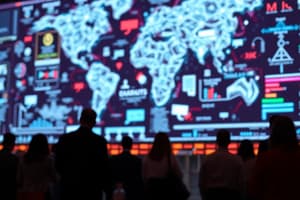Podcast
Questions and Answers
A copyright protects solely original works of 'authorship' like literary works and sound recording.
A copyright protects solely original works of 'authorship' like literary works and sound recording.
True (A)
In the internet, always remember that real people take priority.
In the internet, always remember that real people take priority.
True (A)
Algorithm is a collection of rules that governs what conduct is socially acceptable in a web or digital scenario.
Algorithm is a collection of rules that governs what conduct is socially acceptable in a web or digital scenario.
False (B)
Never post private or embarrassing images or comments in social media.
Never post private or embarrassing images or comments in social media.
Computer addiction is a disorder in which an individual turns to the Internet or plays computer games to change moods.
Computer addiction is a disorder in which an individual turns to the Internet or plays computer games to change moods.
Match column A with column B:
Match column A with column B:
What is Fair Use?
What is Fair Use?
Define Plagiarism.
Define Plagiarism.
What is Cyber Bullying?
What is Cyber Bullying?
Define Laptop Addiction.
Define Laptop Addiction.
Flashcards are hidden until you start studying
Study Notes
Legal Framework
- Republic Act 8293, section 176 indicates that no copyright exists for works created by the Government of the Philippines.
- Approval from the relevant government agency is required for any profit-making exploitation of these works, which may involve royalty payments.
- Copyright holders retain ownership of borrowed materials used in the module, including songs, stories, and trademarks.
Module Purpose
- Designed to enhance understanding of Media and Information Literacy among Senior High School students.
- Aims to develop skills in critical thinking, creativity, and responsible media usage.
- Topics covered include legal, ethical, and societal issues related to media and information.
Learning Outcomes
- Students are expected to apply knowledge of intellectual property, copyright, and fair use guidelines.
- Encourage practical application of legal concepts through real-life situations.
Definitions and Concepts
- Copyright: Protects original works of authorship, including literary and sound recordings.
- Fair Use: Allows limited use of copyrighted material without permission under specific circumstances.
- Plagiarism: Involves copying or closely imitating another's work without permission, intending to misrepresent as original.
- Cyber Bullying: A form of online bullying conducted through electronic technology, such as social media or messaging apps.
Digital Conduct Guidelines
- Always prioritize real people over online personas.
- Avoid posting private, embarrassing images or comments on social media.
- Address computer addiction, which can manifest as reliance on the internet or gaming to cope with emotions or isolation.
Assessment Tools
- True or False statements to evaluate knowledge on copyright and digital conduct.
- Matching type exercises to relate concepts related to media literacy (e.g., copyright, plagiarism, and cyber bullying).
Studying That Suits You
Use AI to generate personalized quizzes and flashcards to suit your learning preferences.




